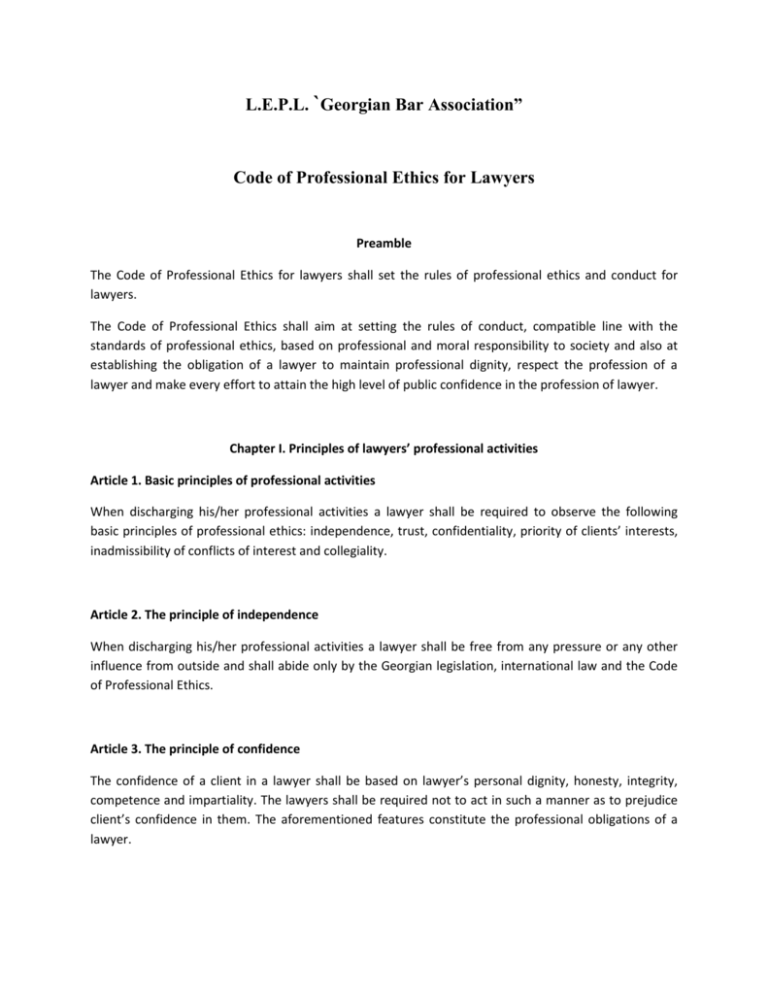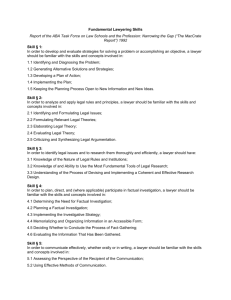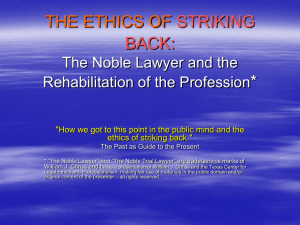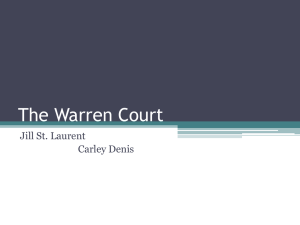GBA Code on Professional Ethics
advertisement

L.E.P.L. `Georgian Bar Association” Code of Professional Ethics for Lawyers Preamble The Code of Professional Ethics for lawyers shall set the rules of professional ethics and conduct for lawyers. The Code of Professional Ethics shall aim at setting the rules of conduct, compatible line with the standards of professional ethics, based on professional and moral responsibility to society and also at establishing the obligation of a lawyer to maintain professional dignity, respect the profession of a lawyer and make every effort to attain the high level of public confidence in the profession of lawyer. Chapter I. Principles of lawyers’ professional activities Article 1. Basic principles of professional activities When discharging his/her professional activities a lawyer shall be required to observe the following basic principles of professional ethics: independence, trust, confidentiality, priority of clients’ interests, inadmissibility of conflicts of interest and collegiality. Article 2. The principle of independence When discharging his/her professional activities a lawyer shall be free from any pressure or any other influence from outside and shall abide only by the Georgian legislation, international law and the Code of Professional Ethics. Article 3. The principle of confidence The confidence of a client in a lawyer shall be based on lawyer’s personal dignity, honesty, integrity, competence and impartiality. The lawyers shall be required not to act in such a manner as to prejudice client’s confidence in them. The aforementioned features constitute the professional obligations of a lawyer. Article 4. The principle of confidentiality 1. Any information that becomes known to a lawyer in the course of discharge of his/her professional activities shall be confidential. 2. The obligation of confidentiality shall not be limited in time. A lawyer shall be authorised to disclose the information about his/her client only under the consent of the latter or in exceptional cases, when it is necessary for the lawyer to protect himself/herself against charges or in cases directly envisaged by law. 3. A lawyer shall require the fulfilment of the same obligations from his/her partners, employees and the other persons invited thereby in the course of discharge of professional activities. Article 5. The principle of priority of client’s interest A lawyer shall always be required to act in the best interests of the clients and give them higher priority as compared with his his/her personal or other persons’ interests. Article 6. The principle of inadmissibility of the conflict of interests 1. A lawyer shall not be authorised to give legal advice or represent two or more clients in the same case when there is a conflict of interests between the clients. 2. The lawyers working for one and the same legal bureau (office, agency, law firm etc) shall not be authorised to give legal advice or represent several persons (clients) in the same case when there is a conflict of interests amongst them or a substantial risk that such conflict may aris . 3. The inadmissibility of conflict of interests envisaged by Paragraphs 1 and 2 of Article 6 shall also apply to cases when a conflict of interest or a risk of it arises in the course of case proceedings. 4. A lawyer shall be required to cease all litigations related to the case when a conflict of interests arises between his/her clients in relation with the case concerned and whenever there is a risk of violation of the principles of confidence or confidentiality. Article 7. Principle of Collegiality In the course of discharge of professional activities, a lawyer shall be required to respect his/her colleagues and not to abuse their dignity. Chapter II. Relationship of a lawyer with the other persons and institutions Article 8. The relationships between a lawyer and a client 1. A lawyer shall launch his relationship with his/her client on the basis of a mutual agreement. If a lawyer could reasonably assume that he/she was concluding an agreement with a person authorized by the client, it is also considered to be an agreement, except for cases of mandatory (compulsory) defence. 2. A lawyer shall handle a case only under the instructions of the client, an authorized representative thereof or a competent person appointed by the relevant authority in the case of compulsory defence. 3. A lawyer shall not be authorises to give guarantees to the client concerning the outcomes of the case. 4. A lawyer shall not be entitled to cease to defend the client’s interests without excusable grounds. 5. A lawyer shall be required to provide a qualified and bona fide advice to a client and represent him/her with due diligence. 6. A lawyer shall be required to inform a client on the progress of case proceedings entrusted thereon and the estimated costs of the litigation according to the procedure agreed with the client. 7. In order to avoid the risk of prejudicing a client, a lawyer shall not exercise the right to withdraw from the case when a client is in a situation, when it deems impossible for a him/her to able to seek for the legal assistance of another lawyer in due course. 8. The procedure of calculation and the rate of lawyer’s fees shall be known to for a client in advance, be acceptable for her/him and depend on the complexity of the case, work load, duration of the proceedings, qualification, and in the case of property disputes – value and importance of the disputed subject (cost of claim). 9. In case of non-payment of lawyer’s fees, the lawyer shall be authorised to withdraw from the case or decline it with due consideration of Paragraph 7 of this Chapter. 10. A lawyer shall not be authorized to pay fee, commission or any other compensation to a person for recommending him/her to a client. 11. A lawyer shall make every effort to solve the case at minimal cost for a client taking into account the circumstances of the case and he/she should advise the client to find the ways of amicable resolution of the case. 12. The lawyer shall be required to maintain detailed and accurate records of the costs of case proceeding, paid by the client. 13. Any money or assets entrusted to a lawyer shall be maintained separately from lawyer’s personal funds or assets and be managed in good faith. The lawyer shall be required to forthwith provide the client with accounts on his/her request. 14. A lawyer shall defend the client’s interests honourably and fearlessly regardless of his/her own interests or any consequences for himself/herself or any other person. Article 9. Lawyers relationship with the court 1. A lawyer appearing before a Georgian or foreign court or tribunal shall be required to observe and respect the rules of conduct of the court/tribunal concerned. 2. A lawyer should not have contact or meet a judge in relation with a specific case without a prior agreement with the lawyer of the opposing party, except for cases, allowed by procedure law . 3. A lawyer should not present the knowingly false evidence to the court. 4. The rules regulating relationships between a lawyer and the courts shall also apply to his/her relationships with the arbitrage and any other persons exercising judicial or quasi-judicial functions. Article 10. Relationships between lawyers 1. A lawyer shall be required to respect his/her colleagues. 2. The corporate spirit of the profession of a lawyer requires a relationship based on mutual trust and cooperation between the layers in order to avoid litigation and any actions that may prejudice their clients. However, it shall be inadmissible for professional interests to prevail over the interests of clients. 3. A lawyer shall not request or receive any fees, commission or any other compensation from other lawyers or any other person for recommending the other lawyer to a client or giving an advice to the latter. 4. If a lawyer is approached by a client having another lawyer, the former shall be required to inform his/her colleague about giving advice or launching rendering some other legal assistance. Chapter III. Final Provisions Article 11. Scope of the Code 1. The Code of Professional Ethics shall apply to lawyers. A lawyer shall be responsible for ethical behaviour of persons acting under his/her instructions or on his/her behalf. 2. The Code of Ethics shall come in force upon its approval by the General Meeting and it shall not have a retroactive effect. 3. Relationships, not regulated by this Code, shall be resolved on the basis of good faith and moral principles and traditions.







